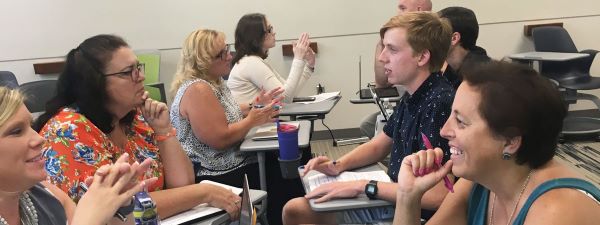
Virginians are experiencing foundational and accelerated changes in many aspects of their communities. This is a decade of new business opportunities leveraging advanced research, uniquely skilled employees, and exciting innovations that influence the economy and workforce. It also is a time in which we are reflecting upon the fabric of our nation, questioning who we have been, who we are, and who we aspire to be.
Demographics are changing almost everywhere. Technology innovation radically impacts the way citizens mobilize and consumers behave and interact. Whether learners are growing up in rural, suburban, or urban settings, all need to acquire competencies that lead to lifelong learning, workforce success, and active participation as citizens. To accomplish this, we must ensure our children grow up in just and equitable school communities that don’t only provide opportunities but make explicit to children and families that those opportunities are accessible to all. To respond to these changes and the needs of today’s learners, educators must spark courageous and meaningful dialogue in every community in the Commonwealth about actions to realize outcomes of the Profile of a Virginia Graduate.
Over the last three years, the Covid-19 Pandemic has impacted every sector of the public and private lives of citizens, the workforce, health and medicine, government, and political governance. We know from longevity data that many of the Pandemic generation of babies born in 2021 will be living well into the 22nd century, their lives shaped by the social, cultural, and physical environment of today. As they become the next generation of children in our school communities, we will no longer be simply educating young people to thrive in the 21st century. We will be educating today’s babies for life in 2100!
The Virginia Department of Education, the Commonwealth Learning Partnership, the Virginia School Consortium for Learning (VaSCL), James Madison University, and with generous start-up support from Ted Dintersmith, author and founder of the What School Could Be network, are partnering to offer Virginia educators the opportunity to innovate structures and practices through a collaborative of Lead Innovation Teams. In the network’s fourth year, VaLIN rebranded as the Virginia Leads Innovation Network and, moving forward, will focus on the need for educators to continuously develop their expertise and skills within a cohort of committed professionals.
Steering Team
Gena Keller (co-chair)
Commonwealth Learning Partnership, Virginia Leads Innovation Network
Pam Moran (co-chair)
Virginia School Consortium for Learning, Virginia Leads Innovation Network
John Almarode
James Madison University
Virginia Department of Education Representative
Tony Borash
Advanced Learning Partnerships
Amy Griffin
Deputy Executive Director, Virginia Association of School Superintendents
Tina Manglicmot
Education Consultant
Amos Fodchuk
Advanced Learning Partnerships
Robert Nomberg
Virginia Learns